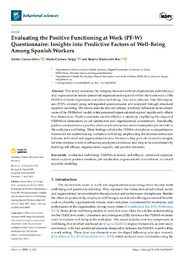Por favor, use este identificador para citar o enlazar este ítem:
https://hdl.handle.net/11000/38376
Evaluating the Positive Functioning at Work (PF-W) Questionnaire: Insights into Predictive Factors of Well-Being Among Spanish Workers
Título :
Evaluating the Positive Functioning at Work (PF-W) Questionnaire: Insights into Predictive Factors of Well-Being Among Spanish Workers |
Autor :
García Selva, Adrián
Neipp López, María del Carmen
Martín del Río, Beatriz |
Editor :
MDPI |
Departamento:
Departamentos de la UMH::Ciencias del Comportamiento y salud |
Fecha de publicación:
2025 |
URI :
https://hdl.handle.net/11000/38376 |
Resumen :
This study examines the interplay between individual predictors (self-efficacy) and organizational factors (perceived organizational support) within the framework of the PERMA+4 model to promote workplace well-being. Data were collected from 545 employees (57.8% women) using self-reported questionnaires and analyzed through structural equation modeling. The results indicate that self-efficacy positively influences seven dimensions of the PERMA+4 model, while perceived organizational support significantly affects five dimensions. Positive emotions are identified as a mediator, amplifying the impact of PERMA+4 dimensions on job satisfaction and organizational commitment. Specifically, positive emotions have a positive effect on job satisfaction, underscoring their pivotal role in the workplace well-being. These findings validate the PERMA+4 model as a comprehensive framework for understanding workplace well-being, emphasizing the dynamic interaction between individual and organizational factors. Moreover, they provide actionable insights for interventions aimed at enhancing employee satisfaction and long-term commitment by fostering self-efficacy, organizational support, and positive emotions.
|
Palabras clave/Materias:
workplace well-being
PERMA+4 model
self-efficacy
perceived organizational support
positive emotions
job satisfaction
organizational commitment
structural equation modeling |
Área de conocimiento :
CDU: Filosofía y psicología: Psicología |
Tipo de documento :
info:eu-repo/semantics/article |
Derechos de acceso:
info:eu-repo/semantics/openAccess
Attribution-NonCommercial-NoDerivatives 4.0 Internacional |
DOI :
https://doi.org/10.3390/bs15040455 |
Publicado en:
Behavioral Sciences |
Aparece en las colecciones:
Artículos Ciencias del Comportamiento y Salud
|
 La licencia se describe como: Atribución-NonComercial-NoDerivada 4.0 Internacional.
La licencia se describe como: Atribución-NonComercial-NoDerivada 4.0 Internacional.
 La licencia se describe como: Atribución-NonComercial-NoDerivada 4.0 Internacional.
La licencia se describe como: Atribución-NonComercial-NoDerivada 4.0 Internacional.
.png)
